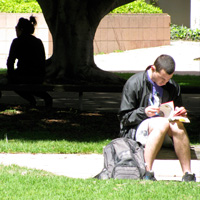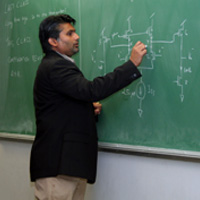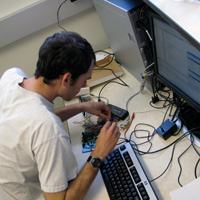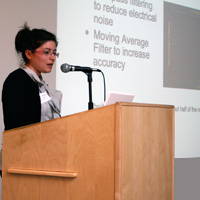Path to Graduation
Each of the four years in the curriculum followed by a typical electrical and computer engineering undergraduate student has a distinct flavor in terms of the types of courses taken, academic goals, and milestones achieved.
The following sections present an overall picture of these four years, provide a sense of the progress made toward graduation, and list specific things to do in order to stay on track. Included with graduation checks and guidelines are steps to take by students who would like to pursue graduate studies in the framework of the B.S./M.S. program.
Freshman Year

Coursework
Besides completing a number of units to fulfill parts of the general education requirements, an EE freshman prepares for foundation subjects in the major by taking mathematics, basic science (physics, chemistry), an introductory ECE lab course (ECE 5) and computer programming courses. Students who already have AP or equivalent credits may take more advanced math and CS courses.
Learn and Experience
Mathematics, basic science, programming, and writing courses provide tools that render specialized courses taken by students in later years both accessible and enjoyable.
Curriculum Reminders and To-Dos
- Discover Engineering (EE Freshman) Meeting: Students will be notified via U-Mail in the Fall
- Advisor Assignments: distributed at the Freshman Meeting or check with the ECE Student Affairs Office (Trailer 380, Room 101)
Sophomore Year

Coursework
The ECE circuits sequence (ECE 2ABC) is the core of the EE sophomore experience. This is somewhat unique to UCSB in that it is a full year hands-on introduction to circuit theory, electronic devices, and analog/digital circuits culminating in the design and construction of a functional infrared audio link. Exposure to mathematics and physics subjects continues in this second year.
Learn and Experience
The foundations of students’ understanding of circuit theory, electronics, physics, and advanced engineering mathematics are completed in the sophomore year. By the end of this year, students will have a basic understanding of electrical engineering that should enable them to explore summer research and internship opportunities.
Junior Year

Coursework
Students will complete most of the required courses in signal processing, digital system design, device physics, electromagnetics, and discrete math and probability. The junior year is also a pivotal point in the curriculum where students begin to identify an elective program to suit their interests.
Learn and Experience
Mastering theoretical and empirical topics, that form the common language of electrical engineering, is required for understanding other upper division courses, but it also forms a foundation for many graduate-level courses. Given that EE students branch out into different specialty areas during the senior year, this common core knowledge is important for effective communication among colleagues in the workplace and in other teamwork contexts.
Curriculum Reminders and To-Dos
- Mandatory Junior Meeting: to discuss Senior Electives and B.S./M.S. Program. Students will be notified via U-Mail in the Fall.
- Deadline for Submission of Senior Elective Sheet: last day Spring Quarter (see Senior Sequence Courses on Sr. Elective Sheet)
- Deadline for B.S./M.S. Application in ECE: last day Spring Quarter
Senior Year

Coursework
The focus of the senior year is on a set of electives in the students’ chosen area of specialization or interest, as well as possible participation in a student design project, internship, and undergraduate research.
Learn and Experience
Two-course sequences (see year of entrance Senior Elective Sheet) provide specialization and depth in areas of interest to students. Other electives allow exploration of additional areas for breadth. The optional EE Senior Capstone Project (ECE 188A/B/C), viewed as an academic career highlight by most students, provides an opportunity to complete a team project, starting from problem definition and ending with the demonstration of a fully functional and tested product during a gathering known as “The Senior Capstone Project Event Day.”
Curriculum Reminders and To-Dos
- B.S./M.S. Students: See ECE Student Affairs Manager if advancing to M.S. status
- M.S. or M.S./Ph.D. ECE Graduate Application: December 15th
- Meet with the Undergraduate Staff Advisor and College of Engineering Advisor to double-check that all graduation requirements are completed